Related Research Articles

Julius Henry "Groucho" Marx was an American comedian, actor, writer, and singer who performed in film and vaudeville and on television, radio, and the stage. He was a master of quick wit and is considered one of America's greatest comedians.

The Marx Brothers were an American family comedy act that was successful in vaudeville, on Broadway, and in 14 motion pictures from 1905 to 1949. Five of the Marx Brothers' fourteen feature films were selected by the American Film Institute (AFI) as among the top 100 comedy films, with two of them, Duck Soup (1933) and A Night at the Opera (1935), in the top fifteen. They are widely considered by critics, scholars and fans to be among the greatest and most influential comedians of the 20th century. The brothers were included in AFI's 100 Years... 100 Stars list of the 25 greatest male stars of Classical Hollywood cinema, the only performers to be included collectively.
The year 1950 in television involved some significant events. Below is a list of television-related events during 1950.
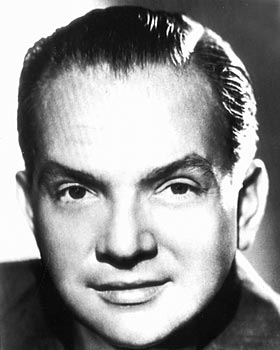
Mark Leo Goodson was an American television producer who specialized in game shows, most frequently with his business partner Bill Todman, with whom he created Goodson-Todman Productions.
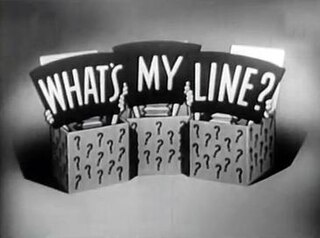
What's My Line? is a panel game show that originally ran in the United States, between 1950 and 1967, on CBS. The game show started in black and white and later in color, with subsequent U.S. revivals. The game uses celebrity panelists to question contestants in order to determine their occupation. The majority of the contestants were from the general public, but there was one weekly celebrity "mystery guest" for whom the panelists were blindfolded. It is on the list of longest-running U.S. primetime network television game-shows. Originally moderated by John Charles Daly and most frequently with regular panelists Dorothy Kilgallen, Arlene Francis, and Bennett Cerf, What's My Line? won three Emmy Awards for "Best Quiz or Audience Participation Show" in 1952, 1953, and 1958 and the Golden Globe Awards for Best TV Show in 1962.

Truth or Consequences is an American game show originally hosted on NBC radio by Ralph Edwards (1940–57) and later on television by Edwards (1950–54), Jack Bailey (1954–56), Bob Barker (1956–75), Steve Dunne (1957–58), Bob Hilton (1977–78) and Larry Anderson (1987–88). The television show ran on CBS, NBC and also in syndication. The premise of the show was to mix the original quiz element of game shows with wacky stunts.
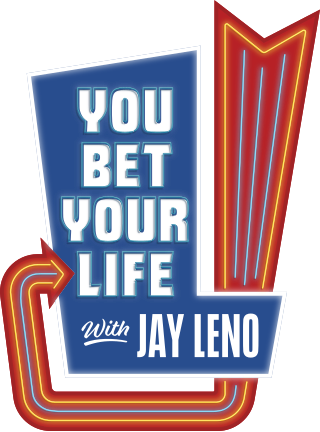
You Bet Your Life is an American comedy quiz series that has aired on both radio and television. The original version was hosted by Groucho Marx of the Marx Brothers, with announcer and sidekick George Fenneman. The show debuted on ABC Radio on October 27, 1947, moved to CBS Radio debuting October 5, 1949, and went to NBC-TV and NBC Radio on October 4, 1950. Because of its simple format, it was possible to broadcast the show on both radio and television but not simultaneously. Many of the laughs on the television show were evoked by Groucho's facial reactions and other visual gimmicks. So the two versions were slightly different. The last episode in a radio format aired on June 10, 1960. The series continued on television for another year, recording the last season, beginning on September 22, 1960, with a new title, The Groucho Show.
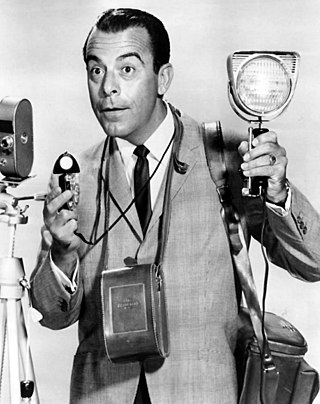
George Watt Fenneman was an American radio and television announcer. Fenneman is best remembered as the show announcer and straight man on Groucho Marx's You Bet Your Life. Marx, said of Fenneman in 1976, "There never was a comedian who was any good unless he had a good straight man, and George was straight on all four sides". Fenneman, born in Peking (Beijing), China, died from respiratory failure in Los Angeles, California, on May 29, 1997, at the age of 77.

Tattletales is an American game show produced by Goodson-Todman Productions in association with Fremantle. The program had two runs on the CBS daytime schedule between February 1974 and June 1984. It was hosted by Bert Convy, with several announcers including Jack Clark, Gene Wood, Johnny Olson and John Harlan providing the voiceover at various times. Wood was the primary announcer during the show's first run, and Olson was announcing during the 1980s.
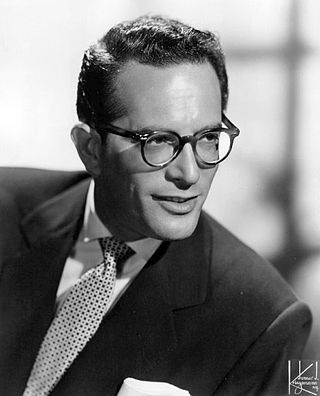
Robert Q. Lewis was an American radio and television entertainer, comedian, game show host and actor. Lewis added the middle initial "Q" to his name accidentally on the air in 1942. He was thinking of radio comedian F. Chase Taylor's character Colonel Lemuel Q. Stoopnagle, and "when I signed off, I declared 'This is Robert Q. Lewis.' I don't know why but that got lots of good reaction." He decided to retain the initial, telling interviewers it stood for "Quizzical."
Information Please is an American radio quiz show, created by Dan Golenpaul, which aired on NBC from May 17, 1938, to April 22, 1951. The title was the contemporary phrase used to request from telephone operators what was then called "information" and later called "directory assistance".
Two for the Money is an American game show television program that ran from 1952 to 1957. The show ran for one season on NBC, and four seasons on CBS. It was a Mark Goodson-Bill Todman production, and was initially sponsored by Old Gold cigarettes. Humorist Herb Shriner was the host for most of the show's run, with fellow humorist Sam Levenson hosting the last season. The game show was initially directed by Paul Alter.

Who Do You Trust? is an American television game show.
The Herb Shriner Show was the title of two different American television series shown in prime time by CBS during the late 1940s and 1950s. A similar program, also hosted by Herb Shriner, was Herb Shriner Time, which was aired by ABC as part of its 1951-52 lineup.

Irene Tedrow was an American character actress in stage, film, television and radio.
Take It or Leave It is a radio quiz show, which ran from April 21, 1940, to July 27, 1947, on CBS. It switched to NBC radio in 1947, and on September 10, 1950, the name of the program was changed to The $64 Question.
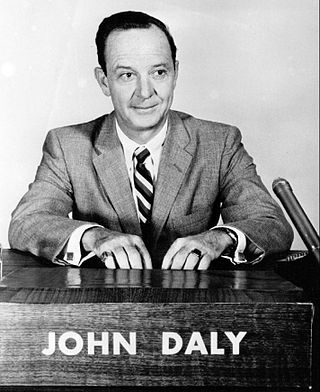
It's News to Me is an American panel game show produced by Mark Goodson and Bill Todman for CBS Television. It was a derivative of Goodson-Todman's own panel show What's My Line?. Originally aired as a one-time special on May 11, 1951; It debuted as a series July 2, 1951, to August 27, 1954.
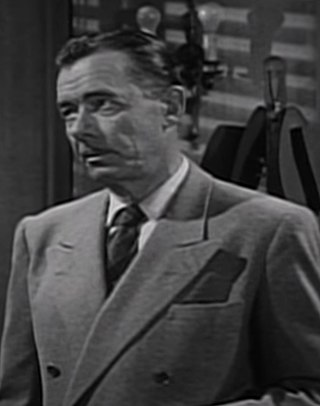
Russell Thorson was an American actor, perhaps best known for his co-starring role as Det. Lt. Otto Lindstrom in ABC's 1959–1962 hit crime drama, The Detectives Starring Robert Taylor.
Hit the Jackpot is an American radio quiz program that was broadcast on CBS from May 9, 1948, through December 27, 1949, and from May 28, 1950, through September 3, 1950. It was originally titled Try 'n' Stop Me and then called Catch Me If You Can before Hit the Jackpot took effect on June 13, 1948.
Sing It Again is an American radio musical quiz program that was broadcast on CBS from May 29, 1948, through June 23, 1951. A television simulcast began on October 7, 1950.
References
- ↑ Dunning, John (May 7, 1998). On the Air: The Encyclopedia of Old-Time Radio. Oxford University Press. p. 567. ISBN 978-0-19-984045-8 . Retrieved September 1, 2023.
- ↑ "NBC Summer Pkgs. Top CBS". Billboard. September 23, 1950. p. 5. Retrieved September 1, 2023.
- ↑ "'Rate Your Mate' On CBS Tonight". The Tampa Times. July 8, 1950. p. 8. Retrieved September 2, 2023– via Newspapers.com.
- 1 2 Terrace, Vincent (September 2, 2015). Radio Programs, 1924-1984: A Catalog of More Than 1800 Shows. McFarland. p. 281. ISBN 978-1-4766-0528-9 . Retrieved September 1, 2023.
- ↑ Goddard, Bob (September 9, 1950). "Dial-Side Seat". St. Louis Globe-Democrat. p. 9. Retrieved September 2, 2023– via Newspapers.com.
- 1 2 3 Remenih, Anton (February 9, 1951). "Groucho Marx finds a rival, even imitator". Chicago Daily Tribune. p. Part 2 - Page 14. Retrieved September 2, 2023– via Newspapers.com.
- ↑ Lohman, Sidney (May 14, 1950). "News of TV and Radio: Cabinet Meeting Will Be Televised by C.B.S." . The New York Times. p. 119. Retrieved September 1, 2023.
- ↑ "Today's Radio Highlights". The Roanoke Times. July 30, 1950. p. 18. Retrieved September 2, 2023– via Newspapers.com.
- ↑ "News By Classes". The Michigan Alumnus. October 21, 1950. p. 64. Retrieved September 1, 2023.
- 1 2 3 "Rate Your Mate". Variety. July 5, 1950. p. 29. Retrieved September 2, 2023.
- 1 2 Ames, Walter (July 7, 1951). "Rate Your Mate on Saturday Radio Schedule; Comic Says Video Must Be Fast-Moving". Los Angeles Times. p. 15. Retrieved September 2, 2023– via Newspapers.com.